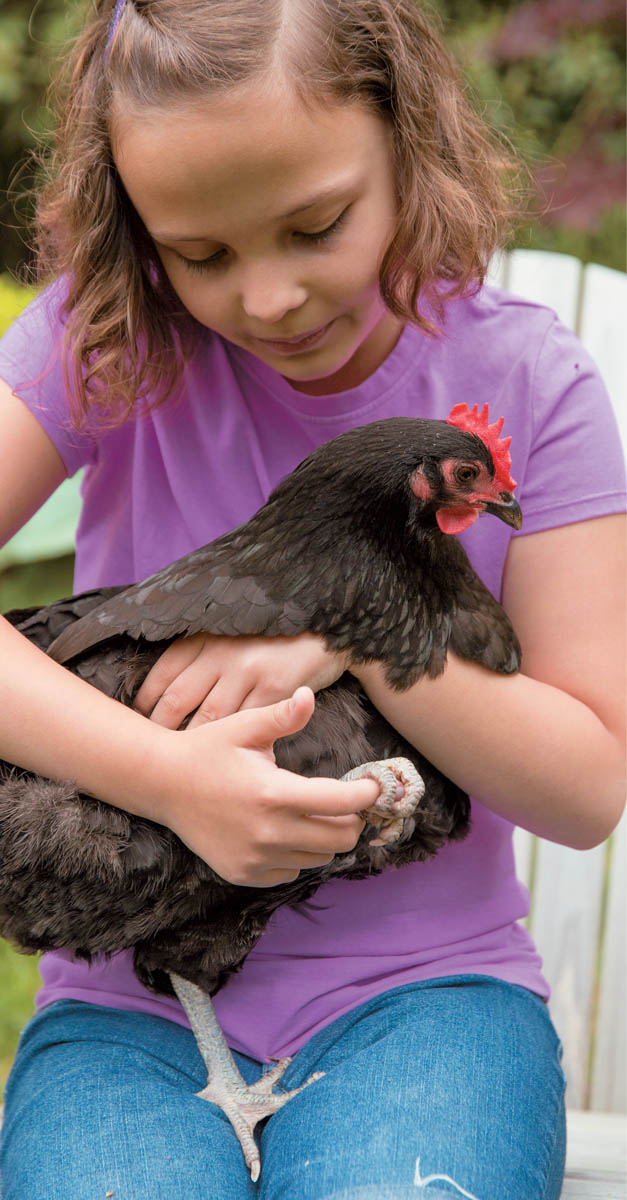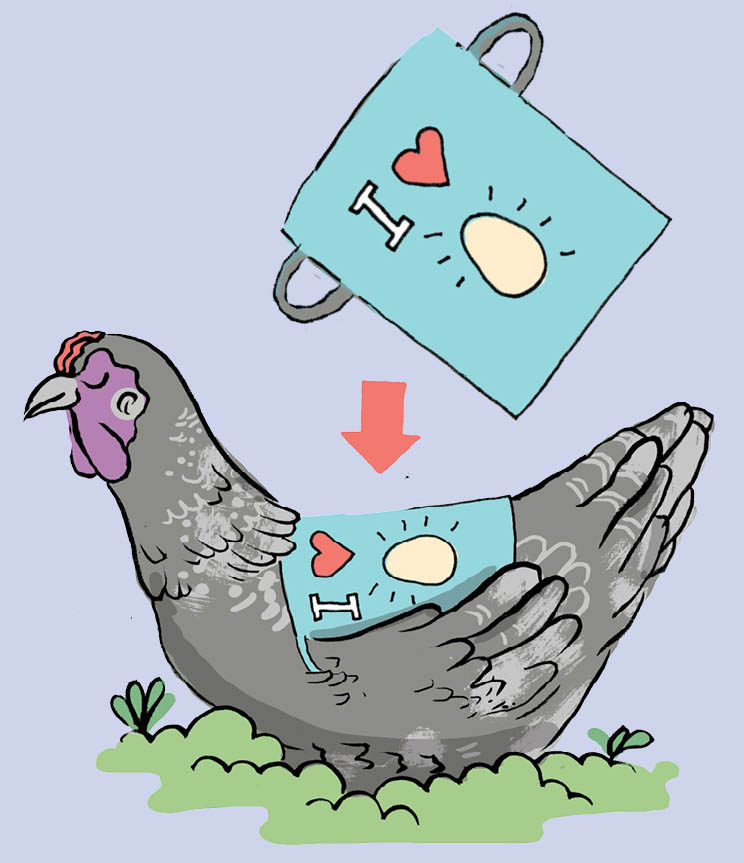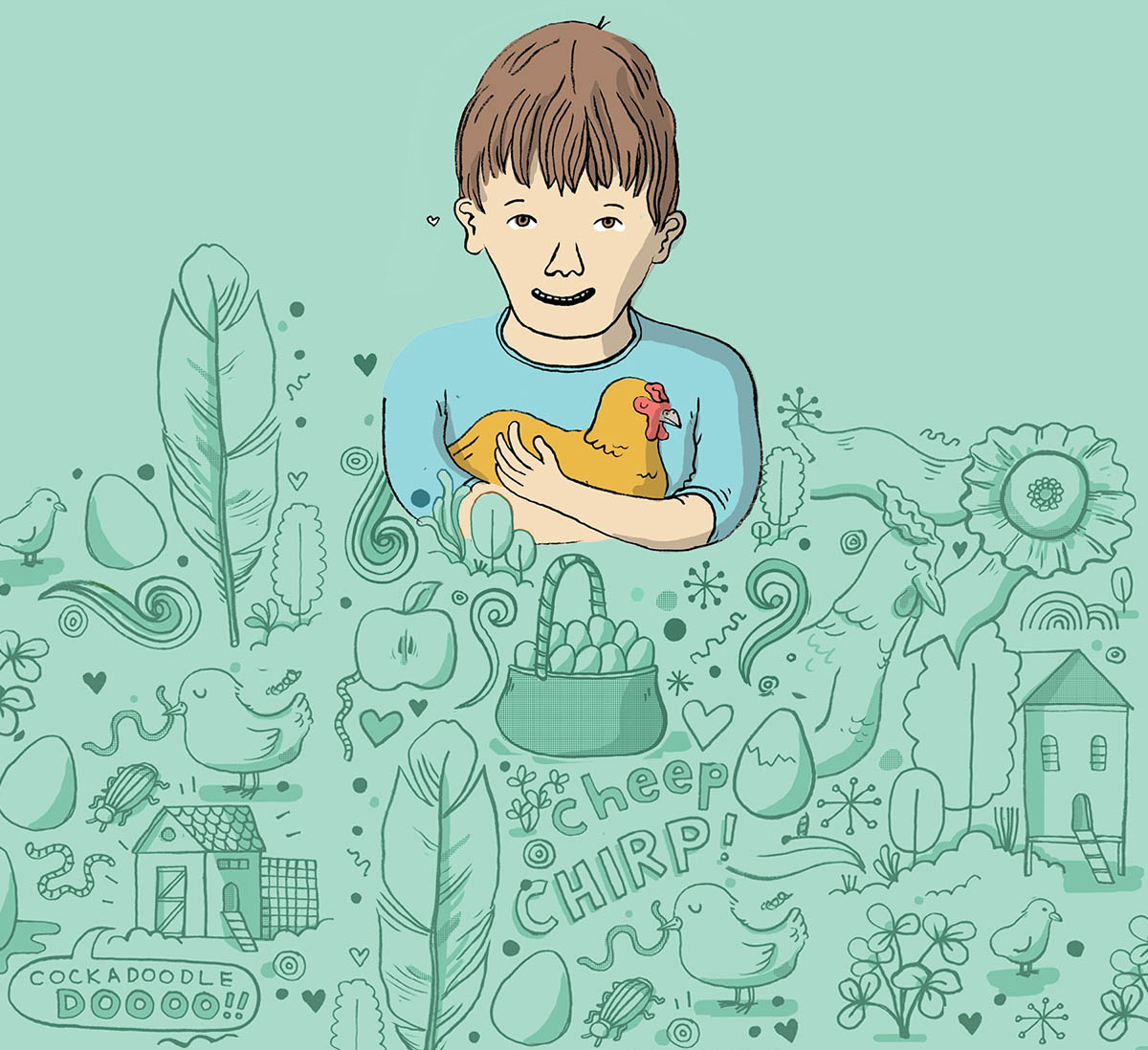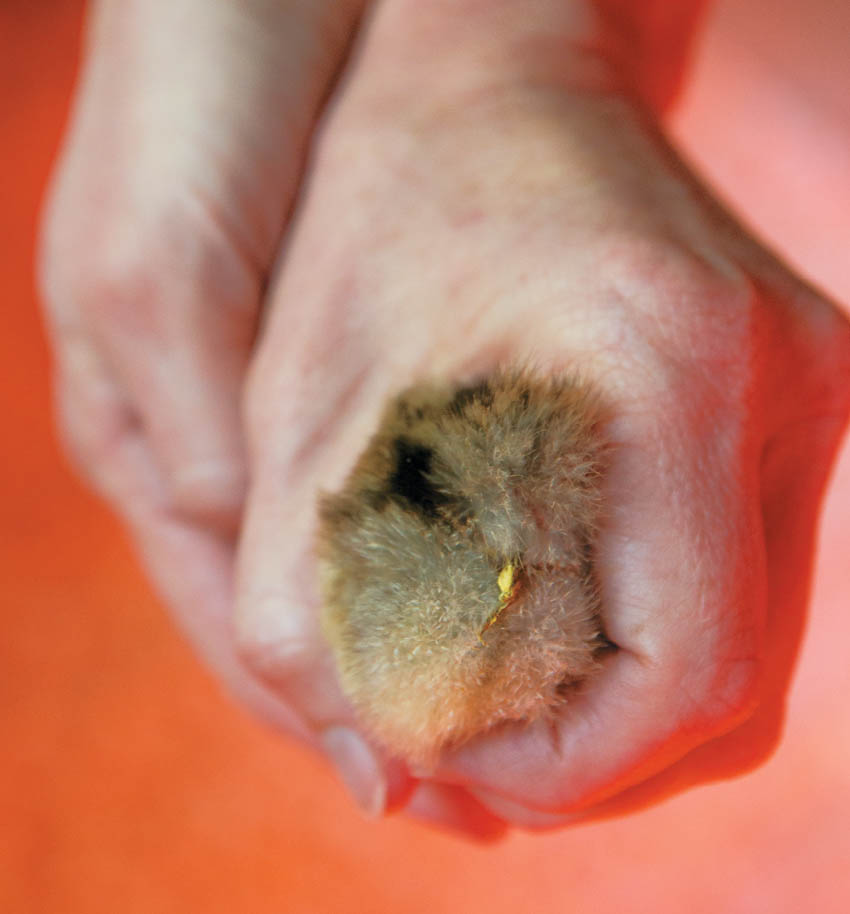
Kept in the right conditions, chickens are generally healthy, but even a well-cared-for bird can become sick or injured. Fortunately, you can do many things to prevent illness and injuries from happening with your flock. As Benjamin Franklin said, “An ounce of prevention is worth a pound of cure.”
You can usually treat minor illnesses or injuries at home, but other times you might need to see a veterinarian who treats chickens. If you feel that one of your chickens might be sick, isolate her away from the flock until you have a proper diagnosis.

If your egg-laying hens require antibiotics, be sure to read the label and to discuss it with your veterinarian. Some medications cannot be used in egg-laying hens. Some medications also have a withdrawal period. This means that during and after administration of that medication, all eggs must be thrown away for a certain amount of time. Never give a chicken antibiotics or medication unless you know the exact diagnosis and what you are treating.
You can treat many minor illnesses and injuries at home, so make a basic first-aid kit for your flock (see the list below). Keep it handy in a sealed plastic box near the coop. Include the phone number of a local veterinarian who treats chickens, along with a notepad and pen or pencil.
It’s also a good idea to have a small pet carrier on hand to isolate any ill birds from the flock until they are diagnosed and while they are healing. A copy of The Chicken Health Handbook by Gail Damerow comes in handy, too.

Keep a couple of hen saddles (material that fits over a hen’s back and around her wings) on hand to protect wounds or prevent over-mating injuries.
One of the main things that you can do as a chicken keeper is to control the environment where your flock lives. Keeping a clean and neat living area helps your flock to remain healthy, as does feeding them good-quality feed and fresh water. Predator proofing is also important. (See chapter 5 for more on proper housing.)
It is important to check your flock every day. Sometimes this just means watching for a few minutes to be sure the chickens are acting normally. Make sure that each bird is lively, curious, moving about regularly, eating, drinking, and making well-formed poops.
When chickens are not feeling well, they will act sleepy, puff up their feathers, or stop interacting with others. They may cough or sneeze or have watery eyes. They may develop diarrhea. If very ill, they may not eat or drink.
It makes sense to accustom your chickens to being handled so you can get a good look at them if you need to. Peek under their wings and around their vents. Do you see any signs of pests? Are their eyes clear? Do you feel any swelling or wounds on their bodies? Inspect their feet, especially on the bottoms. Do you notice any lumps on the bottom of the foot? How are their toenails? How does their crop feel? These are the sorts of questions to ask as you use your eyes and hands to check out each of your flock members.

It’s much easier to examine a hen that is used to being picked up than one that is struggling to escape!
You don’t need to handle each chicken on a daily basis, but if a chicken is showing signs of illness, you will need to act like a detective to figure out what is happening and how to help your chicken. Immediately separate any chicken who is acting ill from the rest of the flock. This is called quarantining. It keeps the sick chicken from infecting the others and allows her to recover in peace.
On the coldest of winter days, we love to wake up the flock with a delicious bowl of warm oatmeal. They seem to look forward to it first thing on a frosty morning. We like to add mix-ins to the oatmeal. The kids call these oatmeal sundaes. The girls sure do love them!

How long have you been keeping chickens?
I have been keeping chickens for five years. In that time, we have had eight different breeds including an Ameraucana, a Dominique, and a Salmon Faverolle.
What do you love about keeping chickens?
I like that the chickens are our friends.
Do you have a favorite breed and why?
Ameraucana, because they are bearded and lay blue eggs.
What is your favorite thing about chickens?
I just like to hang out with them. I like to sit on the grass and let them walk around me and peck at my shoes. I can really observe them. Once I saw my chicken Leela stealing insects from a spider’s web! I love watching my chickens doing funny things.
Do you have any advice for other kids just getting started?
Keeping chickens is fun, but you need to be responsible. Do not let them stay out after dark and don’t let them go near the road. It’s also helpful to know when predators such as foxes are learning to hunt, because juvenile animals tend to kill more. Two other animals to look out for are dogs and fisher cats. Do whatever you need to do to keep your flock safe.
Sometimes, despite your best efforts, bad things can happen to your birds. That is a normal part of keeping chickens. Problems can arise no matter what the age of the chicken. Even a tiny day-old chick can develop problems. Spend time watching your chicks and inspect them a couple times per day. For their size, they can wind up in a heap of trouble!
Chicks poop a lot and sometimes dried poop builds up over their vents, a condition often called pasty butt. Other terms include sticky butt, pasting up, and pasting over. Silkie chicks seem to be especially prone to this condition, perhaps because of their fluff. Pasty butt can also develop from the use of poor-quality chick feed. If the situation is not remedied, the chick can die, so keeping an eye on the bottoms of your chicks is very important, even if it seems silly or gross.
Pasty butt is easy to treat. Gather a bowl of warm water, some paper towels, and a tube of triple antibiotic ointment. Carefully holding the chick, dip your thumb and pointer finger into the warm water and use them to gently moisten the poop. Keep dabbing it with water until it softens, then very gently work it off with your fingers. Do not just pull the poop off. You could cause severe injury.

Pasty butt can happen more than once to the same chick, but all chicks will outgrow it.
Continue until the poop is completely removed. Dry the vent area with paper towels as best you can. Then apply a small dab of triple antibiotic ointment to the vent and return the chick to the brooder. Immediately wash your hands well with warm water and soap (or wear latex gloves, if you prefer).
This serious illness is caused by coccidia, which are protozoa that thrive in moist, warm conditions, such as a dirty brooder. Chicks can easily become infected. They develop bloody diarrhea and can die quite quickly, so it’s better to prevent this disease than to have to treat it.
The best thing you can do is keep your brooder clean and dry. You may have to clean up water spills and wet bedding a couple times each day. This is very important. Medicated chick feed that contains amprolium can help to prevent but not treat coccidiosis.
If any chicks develop bloody diarrhea, isolate them immediately and take a fecal sample to a vet to find out what drugs you need to treat that particular strain of the disease. There are also over-the-counter medicines for it.
Chicks grow so rapidly that they risk developing vitamin and electrolyte deficiencies. Symptoms include lack of energy, not eating or drinking, lying in the brooder with their legs extended, losing balance, falling down, or having a twisted or “wry” neck. Poultry vitamins and electrolytes are readily available in most feed stores in tablet or powder form that you add to their drinking water. Be sure to read the package’s directions. Add some vitamins to your chick’s water source at least a couple times per week for the first few weeks, as a preventive.
Sometimes chicks develop problems with their feet or legs. It may look a bit scary at first, but the problem can often be easily corrected.
You might notice that a chick’s toes on one foot are curled and she is walking on the foot like a fist. This can happen from an injury during hatching or shortly after. When both feet have curled toes, it is usually from a lack of vitamins in the mother hen.
To correct curled toes, start by adding some vitamins and electrolytes to the brooder’s water. Then gather a pair of scissors and a medium-sized adhesive bandage. Trim the sticky sides of the bandage to the same size as the gauze pad. Gently unfurl the chick’s toes and place the foot on the gauze pad, with the toes sticking out slightly. Overlap the adhesive on top of the foot.
Return the chick to the brooder. Do not remove the bandage until it is almost falling off. The toes should straighten in about a week’s time.

Chicks’ legs take a while to build up strength outside the shell. Until their muscles become strong, they are at risk for developing something called splayed leg syndrome. It can occur if the chicks live on slippery bedding, such as newspaper, for their first few days. It can also happen if the hen sits too hard on a chick.
A chick suffering from splayed leg may sit with one leg jutting out to the side or may appear as if she is doing a split. She cannot walk and will use her wings to move around.
Splayed legs can be corrected by hobble-splinting the legs above the “knees” so they remain close together. Over time, the chick will regain the muscle tone and strength to walk correctly. Hobble splints can be made from rubber bands, medical wraps, and medical tape. If you are having difficulty applying the splint, seek help from a veterinarian.

Grown chickens can also have a few health issues, such as parasites or heat stress. It’s important to keep an eye on the crop, which is critical for digestion. Unfortunately, an improperly functioning crop can develop one of several problems, or even a combination of them.
The crop may stop functioning when it becomes clogged or impacted. This can happen from an infection, or if the hen eats long grasses (including hay and straw), tough foods, or foreign objects. When the crop becomes impacted, the chicken does not feel like eating and the crop remains full, unable to empty.
A full normal crop feels about the size of a golf ball. An impacted crop can grow to the size of a tennis ball and can be tender and warm to the touch. If the crop becomes impacted, you can try to move things along by isolating the chicken and feeding her a diet of water and encouraging her to eat soft bread soaked in olive oil. You can also try to gently massage the crop to get things moving.
When treating an impacted crop, avoid regular feed and don’t give any extra treats. If the crop has not emptied or your chicken’s condition has not improved after a few days, you might consider a trip to the veterinarian to have the crop emptied.
Here are some ways to keep your chickens’ crops healthy:
When the delicate balance of the normal bacteria that live in the chicken’s digestive system becomes unbalanced, yeast thrives. Chickens can develop yeast infections in their crops. When this happens, their breath smells fruity and their crops can feel gassy and bubbly. A crop can be sour and impacted at the same time.
Sour crops can develop from an impacted crop, illness, recent medication use, and worms. Unfortunately, sour crop is not an easy thing to treat on your own. Some people try home remedies, including probiotics, plain yogurt, or adding apple cider vinegar to the water (see Dietary Supplements). If these prove unsuccessful after a few days, you may need to ask your vet for an antifungal prescription medication to clear the infection.
Pendulous crops occur when the muscles that hold the crop close to the chest become stretched and lose their strength. This can happen after a chicken has had an impacted crop or has been eating heavy foods. A chicken can thrive despite a pendulous crop, but be sure to pay a little extra attention to this chicken and check her crop regularly to be sure it is emptying and working properly.

When Tilly fills her crop with treats, it remains pendulous for a while, as you can see here.
Unfortunately, chickens sometimes peck at each other’s feathers, even to the point of hurting each other. This behavior can stem from boredom, lack of protein in the diet, changes in the pecking order that lead to bullying, the presence of pests, or lack of space. Sometimes it’s just one chicken who is doing this, but sometimes others begin to copy her and they may gang up on a particular hen. If that hen loses some feathers or bleeds a little from being pecked, the others will attack her even more.
Here are some ideas for preventing feather pecking:
If none of the above work, consider finding another home for the problem chicken.
Parasites are tiny creatures that live on another animal, usually by feeding on their blood. Some common parasites that thrive on chickens are mites, poultry lice, fleas, and ticks. The type of pests that might affect your flock will vary based on your location.
A severe pest infestation can cause chickens to become anemic, lose feathers, stop laying eggs, and even die. Prevention is essential, so become familiar with what these pests look like on chickens. Most pests tend to live around the vents of chickens.
Many products are available to treat a pest infestation, such as shampoos, dips, food-grade diatomaceous earth, herbal remedies, and natural sprays. To treat the problem effectively, know what type of parasite is bothering your flock. Even if you see parasites on only a few birds, you need to treat the whole flock and you should look at your coop management practices. Regularly cleaning and disinfecting the coop helps to prevent these pests from taking up residence and also breaks their life cycle if you do have an infestation.
It’s important to check your flock regularly for these common but very tiny pests.
Fleas are small dark bugs that jump.
Mites are very tiny round bugs that walk quickly on the skin. Most are dark and some turn red when filled with blood.
Poultry lice are little white bugs. You might notice small clusters of eggs on the ends of feathers closest to the skin.
Scaly leg mites live under the scales on a chicken’s legs, giving a rough appearance to the legs.

My dog groomers turned me onto a homemade bug spray for dogs. They swore that if we sprayed our dog right before heading out for hikes in the woods, this spray would repel ticks and fleas. Well, it worked so beautifully, I decided to try it on the chickens! It seems to help them, too.
When spraying this on your chickens, be sure to avoid the head and eyes. Apply only to the back, chest, under the wings, and their fluffy bottoms. All of these ingredients and the spray bottle can most likely be found at your local natural food store.
Use this spray when your flock (and your dog!) are out and about wandering the yard and gardens.

Common intestinal worms that live in chickens’ digestive systems include roundworms, gapeworms, cecal worms, and hairworms. Worms can cause chickens to become anemic, lose weight, and have breathing difficulty. Although it happens very rarely, large roundworms can sometimes be found in an infested chicken’s eggs!
Deworming chickens is a topic of some debate in the chicken-keeping community. Some people deworm their flocks regularly with medication, while others focus on preventive techniques.
Deworming with medication can be done every six months to a year. If you choose to deworm your flock, read the medication labels carefully. Some dewormers cannot be used in meat birds or in hens who are laying eggs. Often, an egg withdrawal time is required — during this time you need to throw away the eggs to be sure you do not ingest the wormer yourself.
Deworming a flock can be stressful on their bodies, so avoid deworming your flock when they are molting.
Non-medicated methods to try to prevent worms include adding food-grade diatomaceous earth or garlic powder to the feed, feeding the flock raw pumpkin seeds, and adding apple cider vinegar to the drinking water. (see Dietary Supplements for more details.)
Egg bound means that a hen is having difficulty passing a particularly large egg. Egg-bound hens typically sit in the nesting boxes, feathers poufed out, looking under the weather. You might notice her tail moving up and down. She might stop eating and drinking.
If you suspect that a hen is egg bound, gently take your hand and feel along the lower abdomen of the hen. It will feel full. Do not press too hard, as you do not want to break the egg inside. A broken egg inside the hen can lead to an infection called egg peritonitis.
If you suspect that you have an egg-bound hen, bring her inside and give her a good soak in the sink in warm (not hot) water with a little bit of Epsom salts added. Dry her with a towel and place her in a warm, quiet place. A dog carrier or a small animal cage, covered with a blanket, works perfectly.
Moist heat can help her to pass the egg, so you can try adding a heat lamp to the enclosure with a pan of warm water underneath the cage’s wire floor to provide extra humidity. Just be careful she does not overheat.
If she does not pass the egg within 24 hours, you might need to take her to the vet for an injection that will stimulate her body to pass the egg.
Sometimes if a hen has been passing rather large eggs or is recovering from being egg bound, her vent can turn a bit “inside out.” If this happens you will notice soft, moist, pink tissue around the vent.
To treat this condition, apply a little 1% hydrocortisone cream to the vent twice a day until it improves.
In the heat and humidity of summer, backyard chickens can easily become susceptible to heat stress. Heat stress is a potentially life-threatening condition in which a chicken is having difficulty cooling herself. Open-mouth panting, lifting the wings, and immobility are all signs of heat stress.
It is always best to prevent heat stress from happening in the first place. On the hottest of summer days, be sure your chickens have access to clean, cool drinking water. Be sure the coop is well ventilated; if it has a window, you might run a fan in it. You can even offer your flock an herbal wading pool.
If a hen appears to be suffering from heat stress, remove her from the flock and place her in cool, not cold, water for a few minutes to try and bring her temperature down. It may take her a few days to recover. In the meantime, she should have access to plenty of water and shade.

Chickens do not sweat. They rely on their combs and wattles for cooling.
In addition to making sure that your flock has plenty of shade and cool drinking water, you can provide them with this simple wading pool to make them more comfortable on especially warm days. If the weather is very hot, add some ice for an extra-cooling effect.

The herbs will entice the chickens to explore the refreshing water. Some chickens will be content to pluck the herbs from the pan, while others may wade right in to cool their feet.

At certain times you will want to defer to the expertise and help of a veterinarian, preferably one who has been trained in avian health. So, when should you call a vet?
The Internet makes it easy to locate a nearby veterinarian. Vets who specialize in chickens can be difficult to locate. In a true emergency, I think you will find most vets would be willing to lend a hand with your ill chicken, but try to establish a relationship with a vet before a crisis.
With a grown-up’s permission, search the Internet for vets in your area. Some words to use in your search include “avian veterinarian,” “veterinarians who see chickens,” or “locate a chicken vet.” I also have a regularly updated list of chicken vets on my website, Tilly’s Nest.
Unfortunately, part of the circle of life involves saying goodbye to flock members when they pass away. Sometimes a chicken will fall ill and die, or you might lose one to a predator. Often, with pet chickens, they simply grow too old.
As hens age, their bodies change, just as humans do. You’ll notice some of these changes as early as four years of age; others begin to show when the girls are around seven years old.
When you believe that your chicken is at the end of her life, you can bring her to your veterinarian for an injection that will quickly and painlessly put her to sleep. This humane service is something that most vets will do for any animal, even if they don’t typically care for chickens.
When a chicken does pass away, bury her deep in the ground with an adult’s help. These times can make you feel very sad, and that is normal and okay. Part of living with animals is accepting that they do not live as long as we do. Focus on the happy memories you have of this flock member.

Unfortunately, goodbyes are part of keeping chickens. Sometimes we must find new homes for flock members, and sometimes a beloved chicken passes away. Even a long life for a chicken seems too short to us. Saying goodbye is never easy, but beginnings and endings are part of life.
Chickens have their own way of adjusting to a loss and have helped my kids to understand the circle of life. An ill or very old chicken seems to know when her time has come. She may find a quiet place away from the flock. We witnessed each member of our flock visit with a dying chicken. Some chickens sat for a while, others clucked and cackled quietly. My kids said they were saying goodbye.
After a loss, the flock seems to remember the missing family member for a while, but they quickly establish a new pecking order and life goes on. When we are missing departed flock members, we go and share some treats with the girls. I like to think that somewhere from up among the clouds, those chickens are looking down at the coop, keeping watch over us.